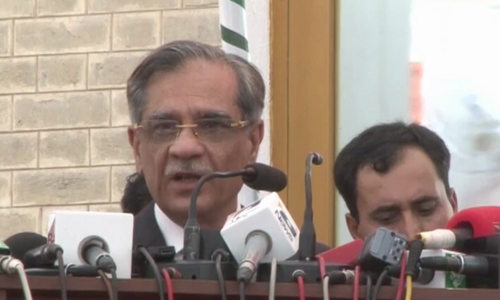Chief Justice Mian Saqib Nisar on Tuesday, during a hearing on Pakistan Medical and Dental Council's (PMDC) legal status and its regulation, stressed on the need for a uniformed educational setup all over Pakistan.
"There is no better jewel than education," the chief justice, who was presiding a three-member bench, remarked, adding, "Is it possible for the entire country to have one book, one bag and one uniform? Innocent children shouldn't be discriminated against and there should be a level playing field in the educational setup."
The court made these remarks during the hearing of a petition filed by the PMDC against a December 2017 ruling of the Lahore High Court, which had declared the PMDC illegal and nullified its 2016 regulations for admissions to MBBS and BDS in medical colleges.
The chief justice, in Tuesday's session, reminded the state that bridging this educational gap is its responsibility, saying, "The education of children between the ages of five and 16 is the state's responsibility. Is the state doing its job? Is the Article 25A of the Constitution just for show?"
PMDC counsel Akram Sheikh agreed with the CJ, alleging that students from Cambridge-regulated schools get preferential treatment. "If O-level students will get preferential treatment then what's going to happen of others."
Sheikh drew the court's attention on the quality of education in rural areas. "Wadairas (feudal landlords) don't allow schools to be opened in their areas."
The chief justice concurred, noting, "There is an area where a school was turned into a buffalo farm. Maybe the wadairas there don't want children to get an education. Our legislators will have to do something about this."
Lateef Khosa, the legal counsel of Dr Asim Hussain, who has been summoned for an appearance before the court on Wednesday in a separate suo moto hearing to explain why he devised policies that benefited private medical colleges, was also present during Tuesday's session.
At court's assessment on the schooling system, Khosa remarked, "Thirty million children don't go to school [in Pakistan]". To this, the chief justice asked, "Who will rectify this? Parliament is the supreme body. This loss of the children's education is taking place because of you and us."
The apex court, under its 2018 agenda, is focusing on human rights issues, particularly those relating to the people’s right to quality education and healthcare. However, the chief justice has clarified that the recent hearings on aforesaid issues are being conducted outside of the court's regular timings and that the court's routine activities are not being affected.














































